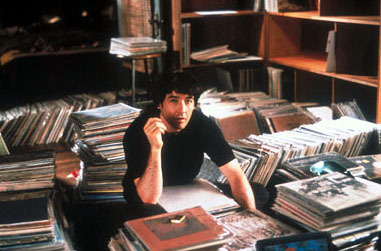
Music and mood
February 20, 2010If you follow me on Twitter, you may have seen this tweet about a week ago:
Warning: Listening to @TheMagFields‘ “All the Umbrellas” can induce psychosomatic cardiac fracture, even in asymptomatic individuals.
followed a day or so later by this:
I am declaring a temporary moratorium on the Magnetic Fields, the National, and the Mountain Goats for the sake of my emotional health.
One of the reasons why I love pop music is the perfect fusion of lyrics and music to create an enormous emotional impact. And these three artists are absolute masters: the cello strokes underlining the chorus in the aforementioned “All the Umbrellas in London,” the way John Darnielle’s voice reaches for and breaks on the high notes in “Woke Up New,” the world-weary timbre of Matt Berninger’s baritone in “Slow Show.” But my decision to take a break from three of my favourite artists was prompted by these words by that other aficionado of the three-minute pop song, Nick Hornby:
What came first, the music or the misery? People worry about kids playing with guns, or watching violent videos, that some sort of culture of violence will take them over. Nobody worries about kids listening to thousands, literally thousands of songs about heartbreak, rejection, pain, misery and loss. Did I listen to pop music because I was miserable? Or was I miserable because I listened to pop music?
(Some of you may remember this as the opening soliloquy in the film version of High Fidelity.)
I decided that, much as I love these three artists, I was on track to test out that second hypothesis. And I figured it wasn’t the kind of experiment that would get ethical approval.
In terms of music and mood (‘affect regulation’), there are two general approaches: to listen to music that aligns with your mood, or to listen to music to distract you or change your mood. There’s some evidence of gender differences: women may be more likely to listen to music that allows them to focus on their negative mood, while men may be more likely to choose music that lets them overcome it. But it doesn’t seem to be terribly well-understood right now. A new iPhone app, MoodAgent, classifies your music and allows you to create playlists based on mood. It’s only been out for a month or so, and already a psychology professor has announced that he’s planning on using it as a tool to examine these relationships between music and emotions.
(focus) MP3: The Magnetic Fields – All the Umbrellas in London [buy]
(distraction) MP3: Mission of Burma – 1, 2 ,3, Partyy! [buy]





Someone told me once that at the peak of German romanticism in like the 19th century a lot of youngsters started committing suicide dramatically in imitation of the works?
Cute Kate Beaton: hipsters ruin everything
This doesn’t seem quite like that necessarily, but I think sometimes teenagers just want to feel miserable and are just looking for models to follow. I listened to a lot of the music I did in middle school because I had a good funk going and I wanted to keep it that way, thank you very much! I do know that what I listen to affects me a lot. I try pretty hard to avoid sad music unless I’m in a mood to wallow.
An excellent point – not everyone wants to self-medicate to feel better!
[…] a recent post, in which I discussed the emotional effect of music and lyrics, I’ve talked to a number of […]
have you tried the app? i don’t have an iphone. does the app classify songs automatically for you?
I haven’t (although I just went and downloaded it – it’s free). I really hope it automatically classifies songs – otherwise it would be a total pain to use.